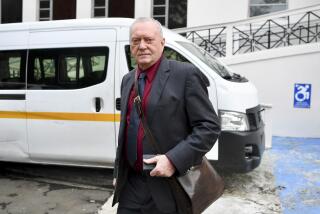Judge Clears Man in Bribe Case
A federal judge acquitted a billboard company owner Wednesday of charges that he conspired to bribe the chairman of the San Bernardino County Board of Supervisors, the county’s chief administrative officer and two members of the Colton City Council.
“It’s been a long, long ordeal,” William “Shep” McCook said after U.S. District Judge Manuel Real announced the verdict in the two-day nonjury trial in Los Angeles federal court. “This whole thing has ruined my life.”
McCook’s legal troubles are not over, however. He faces a trial in January on state bribery charges arising from the same allegations of illegal payoffs.
The case against McCook was part of a major federal investigation into government corruption in San Bernardino County launched in 1997. So far, 19 people have been convicted.
Despite Wednesday’s loss, Assistant U.S. Atty. Edward B. Moreton Jr., the lead prosecutor, said: “We’re happy with the string of convictions we’ve had and hope it sends a message that corruption by government officials will not be tolerated.”
The government accused McCook of paying nearly $70,000 in bribes and of providing free Las Vegas vacations to San Bernardino County Supervisor Gerald Eaves; the county’s chief administrative officer, James Hlawek; and Colton City Council members Abe Beltran and Donald Sanders.
The cash payments were made between 1996 and 1998, while county and city officials were considering a proposal by McCook’s Oakridge Corp. to build seven large billboards on county flood control land near the junction of Interstates 10 and 215 in the city of Colton. McCook subsequently sold five signs for $4.4 million.
McCook’s lawyer, James Riddet, acknowledged that his client made the payments but insisted that they were gratuities and not bribes.
“I think the evidence never pointed to guilt in this case,” Riddet said after the verdict, contending that the government had failed to prove that McCook intended to corrupt any of the four officials. But Riddet declined to say why his client had given the cash and free vacations to the four officials, all of whom have since pleaded guilty to various state and federal corruption charges.
In addition to acquitting McCook on the conspiracy and related money-laundering federal charges, Real made a “special finding” that there was “no evidence of any intent by the defendant to violate any bribery laws of the state of California.” Riddet said he plans to use that finding when he challenges the impending state prosecution on the grounds of double jeopardy.
Assistant U.S. Atty. Andrew Cowan, who delivered the prosecution’s closing argument in the case, said he was not surprised by the verdict, given the judge’s adverse rulings before and during the trial.
Two years ago, Real threw out most of the charges against McCook, contending that the case should never have been brought in federal court. The prosecution successfully challenged the ruling before the U.S. 9th Circuit Court of Appeals.
Over the course of the brief trial, Real overruled most of the objections raised by the two prosecutors. At one point during Cowan’s summation Wednesday, Real interrupted to declare, “The conduct of the government in this case was terrible.” He did not elaborate.
More to Read
Sign up for Essential California
The most important California stories and recommendations in your inbox every morning.
You may occasionally receive promotional content from the Los Angeles Times.









